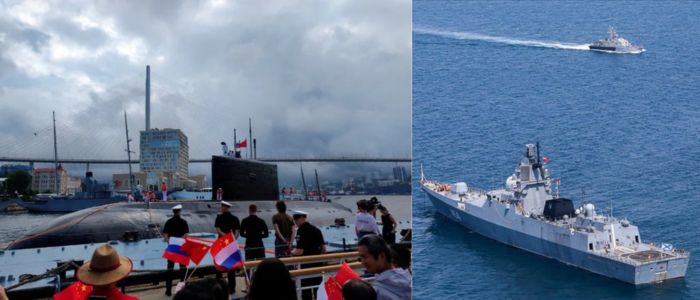The patrol is scheduled after the successful completion of five days trab19831201215026 of joint naval exercises in the Sea of Japan, which focused on operations like air defence and anti-submarine warfare.
The Russian large anti-submarine ship Admiral Tributs and the corvette Gromky took part in them, followed by a pair of Chinese destroyers — the Shaoxing and Urumqi. This was a live-fire exercise, with the ships impersonating enemy submarines to be hunted down and killed.
Formation of New Task Group
The naval units from both countries will reportedly replenish their supplies via two logistical support vessels and then integrate into a new combined task group dedicated to conducting joint patrols in the greater Asia-Pacific region.
The drive is in tune with the growing proximity and coordination between the two naval forces.
The effort expands the small but increasingly significant military relationship between the two countries. Russia and China have been conducting joint air patrols over the Asia-Pacific since 2019.
Defence collaboration has been growing since the two signed a 'no limits' strategic partnership before Russia launched a full-scale invasion of Ukraine in 2022.
Broader Military Strategy and Modernisation
The joint exercises and patrols are Moscow's way of pushing back against what it views as a growing deployment by the United States in the Asia-Pacific. A previous Soviet army general, current Russian chief of staff Valery Gerasimov, had appeared to hint as much in stating that the drills were part of Moscow's defensive strategy for the region.
China, meanwhile, is in the midst of a naval modernisation, making it one of only three nations with an aircraft carrier, and it has outlined plans to create a 'blue water' navy able to operate on a global scale like Britain or the US.
The two states have stressed that the naval exercises and patrols are defensive in nature and not aimed at any single country.
The coming patrol is another indication of the increasingly tight, if uneasy, synergy between Moscow and Beijing in alignment over regional security and global naval reach.
World

Russia, China Plan Joint Asia-Pacific Naval Patrol

After holding the drills in the Sea of Japan, Russian and Chinese naval forces are expected to conduct joint patrol activities in the Asia-Pacific region. Russia's Pacific Fleet made the announcement Friday, saying that naval ships from the Russian Navy and China's People's Liberation Army (PLA) Navy will participate in the patrol.















